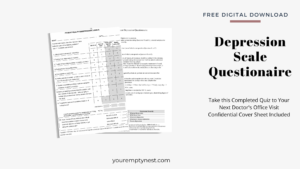Empty Nest Syndrome can look like depression. And it is easy to overlook depression at this time. As a concerned adult child, you may ask “Does my mother have empty nest syndrome?”

Some of the symptoms of depression are:
- extreme sadness and tearfulness,
- loss of interest in things that she usually does for hobbies or groups that she belongs to.
- She may have long periods of not bothering to take a shower, change her clothes, or get appropriately dressed for the day.
- Eating meals can be hit and miss and she may lose weight, or gain weight if her eating habits turn into perpetual munchies.
Please read this post (What is Empty Nest Syndrome) to have a better understanding of this syndrome.
It is entirely natural for a mother to have feelings of sorrow and loss when her child leaves home.

You have become your own adult self. Just as it is a time of adjustment for you, it is a time of adjustment for her too. I remember when my firstborn daughter left home to start college in Provo, Utah. Although I had other children at home, I had a very deep sense of loss. We kept in touch, and I was able to bounce back rather quickly, but is not uncommon for a parent to develop symptoms of depression after their last child leaves the nest but it usually short lived.
Empty Nest Syndrome often looks like situational depression.
However, if symptoms of depression continue for a long period of time, your mother may need to seek medical care.
Now, for you, I have included below a link for a copy of “The Depression Scale” because Empty Nest Syndrome often looks like depression.

It has a legend that will help you gauge if she does indeed have Empty Nest Syndrome or situational depression or is just missing you badly. This form is an actual medical form and can be taken to a doctor’s office and put in her chart if the MD. chooses to. Please feel free to download it for your use. I have included a confidential cover sheet with the download. Print it as many times as you need to. It is a tool for us to use.
I would suggest that you be cautious with diagnosing anyone with a mental illness.

We are not qualified to make any diagnosis. Even with my nursing degree, that is out of my scope of practice. However, a doctor is qualified, and the questionnaire is for his/her review. You may have your mother fill it out, or you may ask her the questions on the form, but you may not fill it out for her based on your observation. Your observations, however, may make her life much nicer if she indeed does have depression, as it is treatable with antidepressants.
As a concerned adult child, you may feel that your mother might have Empty Nest Syndrome, as it can look like depression.
If you have reviewed the Depression Scale and find that you don’t think that she qualifies for the diagnosis, you can still help her. Close contact with regularly scheduled phone calls and visits will assure her that she has no reason to grieve over you. Allow her to miss you all she wants. Make a plan WITH her, it will help her feel empowered. You probably miss her, and your home life too.

I understand that you feel that this breakup, for loss of a better term, may be too much for your mother.
I have felt the same way about my own Empty Nest. However, I have found that time and close contact will bridge the gap and you both will come through this with flying colors. I will also keep you in my thoughts and prayers.
Please hit the link below for your free download of the Depression Scale; it is my hope that you both find it useful.

Recent Comments